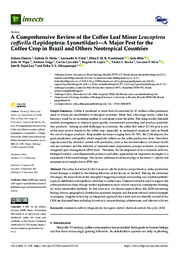A comprehensive review of the coffee leaf miner leucoptera coffeella (lepidoptera: lyonetiidae): a major pest for the coffee crop in Brazil and others neotropical countries.
A comprehensive review of the coffee leaf miner leucoptera coffeella (lepidoptera: lyonetiidae): a major pest for the coffee crop in Brazil and others neotropical countries.
Author(s): ALMEIDA, J. D. de; MOTTA, I. O.; VIDAL, L. A.; NASCIMENTO, E. F. M. B.; BILIO, J.; PUPE, J. M.; VEIGA, A. D.; CARVALHO, C. H. S. de; LOPES, R. B.; ROCHA, T. L.; SILVA, L. P. da; PUJOL-LUZ, J. R.; FREIRE, E. V. S. A.
Summary: The coffee leaf miner (CLM) Leucoptera coffeella moth is a major threat to coffee production. Insect damage is related to the feeding behavior of the larvae on the leaf. During the immature life stages, the insect feeds in the mesophyll triggering necrosis and causing loss of photosynthetic capacity, defoliation and significant yield loss to coffee crops. Chemical control is used to support the coffee production chain, though market requirements move toward conscious consumption claiming for more sustainable methods. In this overview, we discuss aspects about the CLM concerning biology, history, geographical distribution, economic impacts, and the most relevant control strategies in progress. Insights to develop an integrated approach for a safer and eco-friendly control of the CLM are discussed here, including bio-extracts, nanotechnology, pheromones, and tolerant cultivars.
Publication year: 2021
Types of publication: Journal article
Unit: Embrapa Coffee
Observation
Some of Embrapa's publications are published as ePub files. To read them, use or download one of the following free software options to your computer or mobile device. Android: Google Play Books; IOS: iBooks; Windows and Linux: Calibre.
Access other publications
Access the Agricultural Research Database (BDPA) to consult Embrapa's full library collection and records.
Visit Embrapa Bookstore to purchase books and other publications sold by Embrapa.

